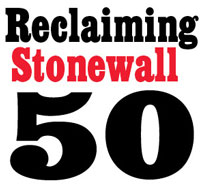 In the years following Stonewall, diverse and vibrant queer cultures flourished, not necessarily hidden, but unknown to most straight people. AIDS devastated those communities, brutally killing so many and unleashing relentless attacks from religious and governmental homophobes.
In the years following Stonewall, diverse and vibrant queer cultures flourished, not necessarily hidden, but unknown to most straight people. AIDS devastated those communities, brutally killing so many and unleashing relentless attacks from religious and governmental homophobes.
Queer people responded by establishing social-service organizations and all varieties of care and support groups, but it was ACT UP that challenged the homophobic regime and forced the changes necessary to mitigate the AIDS crisis. ACT UP was the first great leap for the queer movement after Stonewall.
Although much political work was done from 1969 to 1987, ACT UP transformed queer organizing. Like any other activist group, ACT UP did not always live up to its best ideals, but its members encouraged, coaxed, and cajoled each other into fighting every day to make the change necessary to end the AIDS crisis.
I don’t think you can exaggerate the strength gained from lesbians, gay men, trans people, straight women, and a few straight men working together, learning from one another the wisdom of previous struggles. No doubt the most important experience came from the women’s movement and especially the feminist health movement, which understood the systems of oppression against women, people of color, and queer people endemic to the US health-care system. ACT UP made “health care is a right” into a mainstream idea, even if that concept is still being challenged 30 years on.
The care and creativity that went into designing posters and the cleverness that brought forth so many memorable, delightful chants altered the way demonstrations looked and sounded. Leadership was fluid; new people stood up as people died or exhausted themselves. Education within the movement was also democratized, so that everyone could be a spokesperson, not just a small elite. Ideas and needs arose from the membership, not imposed by leadership. The result was that ACT UP responded to the needs of the many, not to the needs of the elite. This is all very queer.
ACT UP brought real power to queer people for the first time. The events and subsequent grassroots political action that we now refer to as Stonewall brought visibility and self-esteem. Stonewall may have been more important for the changes it brought to the community than to the changes it made to the larger society. ACT UP, in contrast, changed the whole country. For the first time, the general public saw queer people as determined, strong, smart, articulate, and having a modicum of power.
Finally, ACT UP made gay sex joyous again. AIDS had re-stigmatized gay sex and provided our right-wing and homophobic enemies the ammunition to assault the queer community. The attacks were against the entire queer community—the homophobes did not care that lesbians rarely got AIDS. They were determined to obliterate our progress against heterosexual domination.
ACT UP was successful, but its fight didn’t end. Today HIV/AIDS is too often ignored as a problem of the past. Too many people are still being forgotten, especially people of color and trans people, and do not get the health care they need. The availability of pre-exposure prophylaxis, better known as PrEP, is not democratized. And people with HIV/AIDS are being criminalized and thrown in jail.
The elite, more conservative elements of the gay movement hijacked the success of AIDS activism to push for gay marriage and gays in the military. Gay marriage has become the new closet. It promotes a desexualized, normalized, contained, and controlled married gay person that straight people can be comfortable with. LGBT people have the right to marry and to fight in the military, but not the right to be queer.
ACT UP made progress, because it offered specific solutions to particular problems. Its actions engaged with the most profoundly intimate of subjects: sex, caregiving, and death. The challenges of the future—climate change, plutocracy, racism, homophobia, misogyny—will require different types of radical change, but it must include a commitment to sexual liberation.


